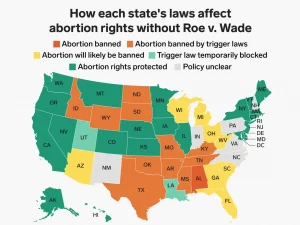Companies’ health insurance plans play a huge part in the lives of their employees. A recent survey has found that half of the country receives health insurance through their workplace. The role of employers in healthcare has become even more complex lately due to the Supreme Court’s recent decision to overturn Roe V. Wade. With its ruling, the Supreme Court has struck down the federal constitutional right to an abortion, leaving it up to individual states to decide whether they will allow abortion within their borders. This has created a patchwork of different reproductive health laws across the country, with the status of abortion varying greatly state-by-state

This complex situation represents a steep challenge for companies who still wish to provide their workers with access to abortion through their group healthcare plans. Businesses have been forced to contend with several hurdles – from differing state ordinances, to the nuances of insurance laws, to the evolving nature of abortion legislation – in order to provide their employees with reproductive health coverage, no matter which state they reside in. Here are a couple of common avenues that some companies have taken:
Businesses Are Paying for Abortion-Related Travel
People obviously cannot get abortions through the company health plan in states where abortion has been banned. Instead, in the wake of the Supreme Court’s ruling, many companies announced that they would cover the travel expenses of employees who had to leave their state in order to get an abortion. The following businesses – along with many others – have pledged to offer reimbursements through their group health insurance plans for out-of-state abortion travel:
- Yelp
- Goldman Sachs
- Macy’s
- Dick’s Sporting Goods.
- Intuit
- Airbnb
- Netflix
- Starbucks
- Tesla
- Microsoft
- Kroger
- Emtrain
Some have raised concerns that workers who wished to make use of these reimbursements might have to reveal intimate details of their personal life to their employers. Businesses sought to assuage these concerns by stating reimbursements will be processed entirely through the health insurance provider. As a spokeswoman from Yelp explained, “No one at Yelp will ever receive any information on who incurred a claim or received reimbursement,”
Avoiding Legal Issues of Travel Reimbursements
Aside from the aforementioned privacy issues, there are also legal barriers for employers who wish to provide abortion related travel reimbursements through their health insurance plans. The Employment Retirement Income Security Act (ERISA) establishes guidelines for how companies’ medical plans may cover travel for medical care. ERISA specifically designates medical transportation as a reimbursable medical expense and sets various rules on how this expense can be administered. Companies that wish to provide reimbursement for abortion-related travel must check beforehand to make sure their policies are ERISA-compliant.
Companies likewise should be sure to obey the Mental Health Parity and Addictions Equity Act, which states that businesses must offer mental health/addiction counseling benefits equal to their other medical benefits plans. Though law has yet to be tested in this particular instance, one interpretation of the legislation is that companies who offer reimbursements for reproductive health travel would also be required to reimburse out-of-state travel for mental health and addiction counseling.
As of now, it’s unclear whether these travel reimbursements will hold up long in the run. States opposed to abortion could attempt to make laws hindering out-of-state travel for abortions. As with many aspects of reproductive health in America, the future remains uncertain.
Going Beyond Travel Reimbursements
Some companies have sought alternatives to an abortion related travel reimbursement covered through a group health insurance plans. Seeking to cut through the complexities of insurance law, some have suggested other ways to finance out-of-state travel, such as creating an independent relief fund within the company to cover travel expenses. However, most legal experts discourage the use of these tactics. A statement by the employment law firm Jackson Lewis warned, “If an employer provides a travel benefit outside of its group health plan, the employer could unwittingly create another group health plan that would raise numerous compliance issues”
Following the Roe ruling, some employers have become increasingly interested in expanding general reproductive health coverage through their companies’ group insurance plans. One of the consequences of the pandemic is that telehealth medicine has become far more common than ever before. Businesses can now offer their employees telehealth coverage including reproductive health check ups, testing, and examinations. It is even possible now for doctors to prescribe abortion medication via telehealth, allowing people to undergo safe, medicated abortions simply by taking a pill in their own home.
How Emtrain Is Doing Its Part
Emtrain itself has taken a combination of different strategies to ensure that its employees have access to reproductive healthcare. “We have added a medical travel stipend to assist employees who need to travel for medical procedures that are not available in their immediate vicinity,” said Emtrain Director of People Operations Kristin Davis, “We have also added unlimited telehealth benefits that include access to mental healthcare, second opinions, nutrition, and dermatology”.
The steps companies have taken to ensure the reproductive health of their employees make a substantive impact on their workplace culture. Looking at a company’s insurance plan, you get a strong sense of what that company cares about and what its priorities are for its employees. Employers should remember this when creating their own benefits plans, and work to create insurance plans that reflect a strong culture for employees and the business. Contact us to learn more about Emtrain’s updated health insurance plan and how we can help your workplace culture.
UPDATE JULY 13 2022
Executive Order 14076, officially titled Protecting Access to Reproductive Healthcare Services, was signed on July 8, 2022, and is the 92nd executive order signed by President of the United States Joe Biden. The Executive Order protects access to reproductive health care services. Two weeks prior, the Supreme Court issued a decision that overturned Roe v. Wade and eliminated a woman’s constitutional right to choose.
For more information:
White House Fact Sheet
Executive Order 14076 : Executive Order on Protecting Access to Reproductive Healthcare Services









